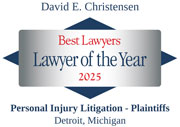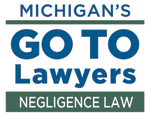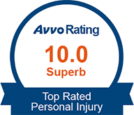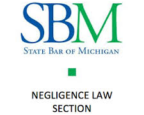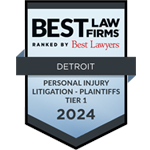
Driving a heavy truck requires a driver’s full attention. Truck drivers must also monitor their dispatch radio, follow directions or turn-by-turn navigations, all while focusing on the road and safely maneuvering their very large rigs. There’s zero room for error. But when a commercial driver engages in distracted driving, their trucks turn into ticking time bombs.
Truck drivers are tempted by many of the same distractions that attract other drivers behind the wheel. But because truck accidents often result in severe injuries and more extensive property damage, distracted truck driving can pose an even greater risk to anyone unfortunate enough to be in the truck’s path.
If you or a loved one was hurt in a distracted truck driving accident in Michigan, you deserve to be compensated fully for your injuries and losses. An experienced truck accident lawyer at Christensen Law can help you seek maximum compensation.
The legal team at Christensen Law is recognized for excellence and getting top-dollar results for truck accident victims, including a record $17.8 million verdict for a driver struck by a commercial truck in Wayne County and a $1.1 million verdict for a trucker who suffered back injuries after being hit by another truck driver in Michigan.
Our attorneys work aggressively to prevent big corporations and insurance companies from taking advantage of accident victims who are at their most vulnerable. We will take the time to listen to you and explain what to expect in your case. Your voice deserves to be heard — let us advocate for you.
Learn more about how an experienced distracted truck driving accident lawyer from Christensen Law can help you seek justice today. Call or contact us for a free consultation.
Dangers of Distracted Driving
Distracted driving is often cited as being just as dangerous as driving under the influence of alcohol or drugs. Like an impaired driver, a distracted driver cannot respond effectively to avoid collisions because their attention is not on the road.
It only takes a few seconds of distraction to cause a truck accident. Tractor-trailers cannot maneuver as well as passenger vehicles. Trucks also require a much greater distance to come to a stop. As a result, every fraction of a second that a truck driver is distracted increases the risk that they will not have enough time or distance to avoid an emergency.
Even when a distracted driver puts their attention back on the road in time to avoid an accident, sudden braking or swerving can cause a commercial truck to jackknife or roll over, increasing the risk of a multi-car truck accident.
Types of Distractions
Common activities that distract truck drivers include:
- Texting while driving
- Writing or reading e-mails on a cell phone, tablet, or laptop computer
- Adjusting the radio or climate controls
- Eating or drinking
- Personal grooming
- Smoking
- Interacting with passengers or other vehicle occupants
- Reaching for objects inside the cab
- Looking at billboards, signs, buildings, other vehicles, or pedestrians
- Daydreaming
Truck drivers also have distractions unique to their profession, such as using maps or navigation systems to plot a route or reroute around heavy traffic, monitoring the truck’s systems, and using the truck’s dispatch radio to communicate with the trucking company.
Truck drivers often drive for many hours a day, usually for several days at a time. Fatigue can make it difficult for drivers to stay focused on their surroundings, sometimes without them even realizing the degree of their impairment.
How Do You Recognize a Distracted Driver?
On the road, watch out for telltale signs of a distracted truck driver. Common signs of distracted driving include:
- Swerving in and out of lanes
- Drifting off the road, over the centerline, or median
- Not promptly reacting to the traffic light turning green
- Sudden or late turns or lane changes to reach a highway exit
- Sudden braking in response to slowed or stopped traffic
- Gradual changes in speed
- Inability to keep pace with traffic
- Driver’s head is looking down or around the cabin, not at the road or at mirrors
Keep your distance and contact law enforcement if you encounter a truck on the road that you suspect is operated by a distracted driver.
How to Prove That the Truck Driver Was Distracted
Your ability to obtain compensation for pain and suffering in a Michigan distracted driving truck accident case will depend on the severity of your injuries and proof that the trucker was negligent in causing the accident.
First, you will need to show that your injury meets a threshold set by Michigan no-fault laws. A serious injury must meet the criteria for a “serious impairment of bodily function” that is directly observable and affects a person’s ability to function in daily life.
Next, you’ll need solid evidence to demonstrate that a driver was distracted before a crash. Examples include:
- The driver’s cell phone records can show when the phone was activated, what applications were being used, or when texts, emails, or phone calls were sent or received. A driver who receives or sends a text in the moments before an accident was likely distracted when the crash occurred.
- Dispatch records can show if the truck driver made or received a transmission on their radio before the accident.
- The truck’s electronic data recorder can record information about the truck’s operation, including its position, speed, acceleration, braking, or steering inputs. This data can show if the truck driver engaged in common distracted driving behaviors, such as gradually losing speed followed by speeding back up or otherwise being unable to keep pace with traffic.
- Accident scene photos, which may show skid marks on the road that indicate the truck driver made too late of an effort to brake or swerve to avoid the accident. Photos may also include snapshots from inside the truck cab, revealing evidence that the driver was distracted by something prior to the crash.
- Dashcam footage may be used to show that the truck was moving in distinct patterns that are often associated with distracted driving, such as swerving or drifting off the road.
- In-cab camera footage monitors driver performance and may show them engaging in distracted driving activities, such as using a cell phone.
- Drivers’ logs can show whether a truck driver complied with federal standards regarding rest breaks. A tired or fatigued truck driver may be more likely to get distracted while behind the wheel or otherwise lose focus on the road.
- Eyewitness statements
- Police crash reports may include an opinion from the investigating officer that the truck driver was distracted before the accident.
It’s wise to contact a truck accident attorney as soon as possible after a truck accident. Truck companies are not required to keep certain records indefinitely. That creates a risk that important evidence may be lost or deleted in the days, weeks, and months following a truck accident.
In addition, truck companies and their employees are protected by powerful insurance companies. It’s guaranteed that they’ll send an adjuster to the scene of a serious wreck immediately. If you’ve been severely injured, getting medical treatment will be the most important priority. Hiring a lawyer will allow an independent investigation to begin while you heal.
Experienced truck accident attorneys will also have connections with accident reconstruction experts who can review evidence to develop testimony to help show that a distracted truck driver caused a truck crash.
Contact a Distracted Truck Driving Accident Attorney in Michigan
If you’ve been injured in a distracted driving truck accident in Michigan, get a tough and experienced truck accident lawyer on your side to demand maximum compensation for your losses. Contact Christensen Law. The first consultation is always free. With offices in Detroit, Southfield, Grand Rapids, and Ann Arbor, we can meet whenever and wherever is most comfortable for you. Call or contact us for a free consultation.



